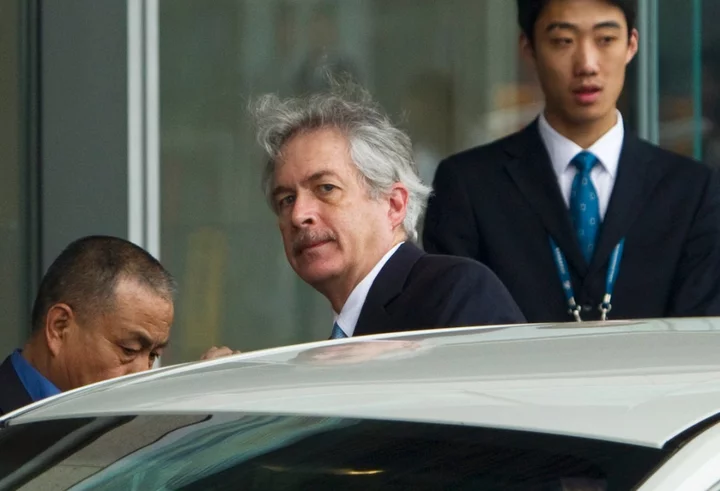
CIA Director William Burns met Chinese leaders in Beijing as Washington tries to thaw tensions
CIA Director William Burns went to Beijing in May to meet with Chinese counterparts, a U.S. official said on Friday, in what is the highest level visit by a Biden administration official since a suspected Chinese spy balloon was shot down by American forces. Burns' visit, first reported by The Financial Times, comes as Washington tries to cool tensions with Beijing over the balloon and other recent conflicts between the world's two largest economies and geopolitical rivals. U.S. officials have long warned that China rejects their efforts at outreach. That raises the possibility of miscommunication spiraling into conflict, they say. “Last month, Director Burns traveled to Beijing where he met with Chinese counterparts and emphasized the importance of maintaining open lines of communication in intelligence channels,” said a U.S. official who spoke on condition of anonymity to discuss Burns' schedule, which is classified. Defense Secretary Lloyd Austin also spoke “briefly” Friday with Li Shangfu, China's minister of national defense, at the opening dinner of a security forum in Singapore. China had earlier rejected Austin's request for a meeting on the sidelines of the forum. President Joe Biden has often sent Burns on sensitive trips to meet U.S. adversaries. Burns went to Moscow in late 2021 to confront Russian President Vladimir Putin about indications that Russia was gearing up to launch a new invasion of Ukraine. Read More Ukraine war’s heaviest fight rages in east - follow live Charity boss speaks out over ‘traumatic’ encounter with royal aide
1970-01-01 08:00

The Best Prototypes and Concept Products of Computex 2023
Seeing the spirit of PC building alive and well through the many prototypes and concepts
1970-01-01 08:00
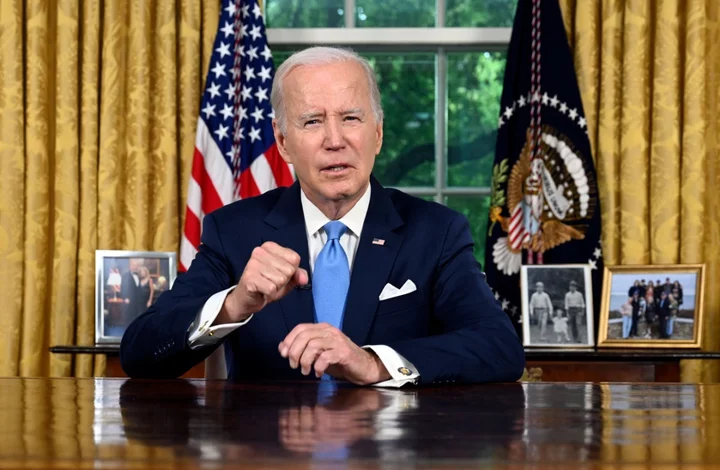
Biden expected to sign budget deal to raise debt ceiling
President Joe Biden is expected to sign legislation on Saturday to raise the debt ceiling, just two days before the U.S. Treasury warned that the country would struggle to pay its bills. The bipartisan measure, which was approved this week by the House and Senate, eliminates the potential for an unprecedented government default. “Passing this budget agreement was critical. The stakes could not have been higher," Biden said from the Oval Office on Friday evening. “Nothing would have been more catastrophic,” he said, than defaulting on the country's debt. The agreement was hashed out by Biden and House Speaker Kevin McCarthy, giving Republicans some of their demanded federal spending cuts but holding the line on major Democratic priorities. It raises the debt limit until 2025 — after the 2024 presidential election — and gives legislators budget targets for the next two years in hopes of assuring fiscal stability as the political season heats up. “No one got everything they wanted but the American people got what they needed,” Biden said, highlighting the “compromise and consensus” in the deal. “We averted an economic crisis and an economic collapse.” Biden used the opportunity to itemize the achievements of his first term as he runs for reelection, including support for high-tech manufacturing, infrastructure investments and financial incentives for fighting climate change. He also highlighted ways he blunted Republican efforts to roll back his agenda and achieve deeper cuts. “We’re cutting spending and bringing deficits down at the same time,” Biden said. “We're protecting important priorities from Social Security to Medicare to Medicaid to veterans to our transformational investments in infrastructure and clean energy.” Even as he pledged to continue working with Republicans, Biden also drew contrasts with the opposing party, particularly when it comes to raising taxes on the wealthy, something the Democratic president has sought. It’s something he suggested may need to wait until a second term. “I’m going to be coming back,” he said. “With your help, I’m going to win.” Biden's remarks were the most detailed comments from the Democratic president on the compromise he and his staff negotiated. He largely remained quiet publicly during the high-stakes talks, a decision that frustrated some members of his party but was intended to give space for both sides to reach a deal and for lawmakers to vote it to his desk. Biden praised McCarthy and his negotiators for operating in good faith, and all congressional leaders for ensuring swift passage of the legislation. “They acted responsibly, and put the good of the country ahead of politics,” he said. Overall, the 99-page bill restricts spending for the next two years and changes some policies, including imposing new work requirements for older Americans receiving food aid and greenlighting an Appalachian natural gas pipeline that many Democrats oppose. Some environmental rules were modified to help streamline approvals for infrastructure and energy projects — a move long sought by moderates in Congress. The Congressional Budget Office estimates it could actually expand total eligibility for federal food assistance, with the elimination of work requirements for veterans, homeless people and young people leaving foster care. The legislation also bolsters funds for defense and veterans, cuts back some new money for the Internal Revenue Service and rejects Biden’s call to roll back Trump-era tax breaks on corporations and the wealthy to help cover the nation’s deficits. But the White House said the IRS' plans to step up enforcement of tax laws for high-income earners and corporations would continue. The agreement imposes an automatic overall 1% cut to spending programs if Congress fails to approve its annual spending bills — a measure designed to pressure lawmakers of both parties to reach consensus before the end of the fiscal year in September. In both chambers, more Democrats backed the legislation than Republicans, but both parties were critical to its passage. In the Senate the tally was 63-36 including 46 Democrats and independents and 17 Republicans in favor, 31 Republicans along with four Democrats and one independent who caucuses with the Democrats opposed. The vote in the House was 314-117. ___ AP Congressional Correspondent Lisa Mascaro contributed to this report. Read More Ukraine war’s heaviest fight rages in east - follow live Charity boss speaks out over ‘traumatic’ encounter with royal aide FBI offers to show GOP chairman document that purports to relate to Biden, his family Republicans schedule 1st presidential debate for Aug. 23, but there's no guarantee Trump will attend DeSantis wraps up 1st early states tour as candidate with more personal touch in South Carolina
1970-01-01 08:00
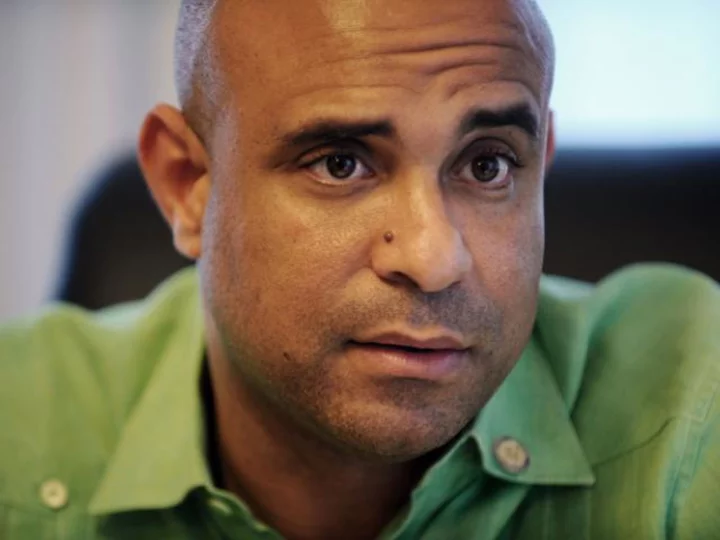
State Department sanctions former Haitian Prime Minister Lamothe for corruption
US Secretary of State Antony Blinken announced Friday the sanction of former Haitian Prime Minister Laurent Lamothe for the alleged misuse of tens of millions of dollars.
1970-01-01 08:00

Secret Service implements tougher penalties after probe finds agents were on phones and missed intruder at national security adviser's home
The US Secret Service implemented tougher disciplinary measures after preliminary findings from an internal investigation found agents missed an intruder at national security adviser Jake Sullivan's home in part because they were using their personal phones, people briefed on the matter said.
1970-01-01 08:00
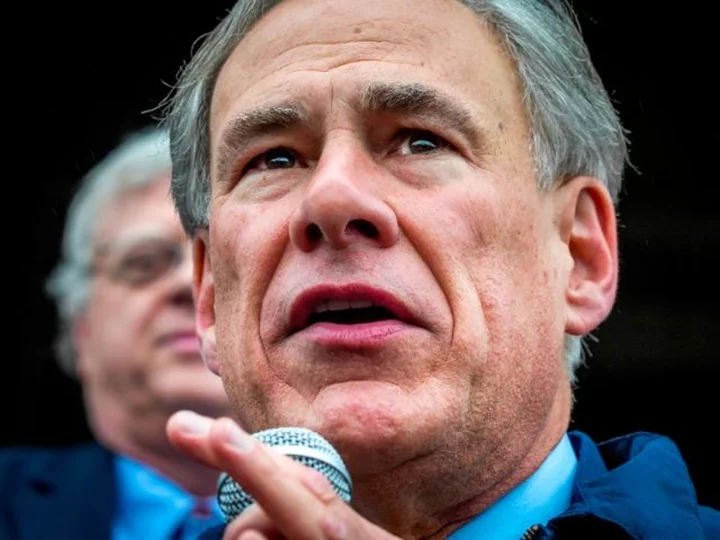
Texas governor signs ban on gender-affirming care for minors
Texas Republican Gov. Greg Abbott on Friday signed into law a ban on gender-affirming care for most minors in the state, making Texas the largest state in the US to place restrictions on transgender youth's access to critical care.
1970-01-01 08:00
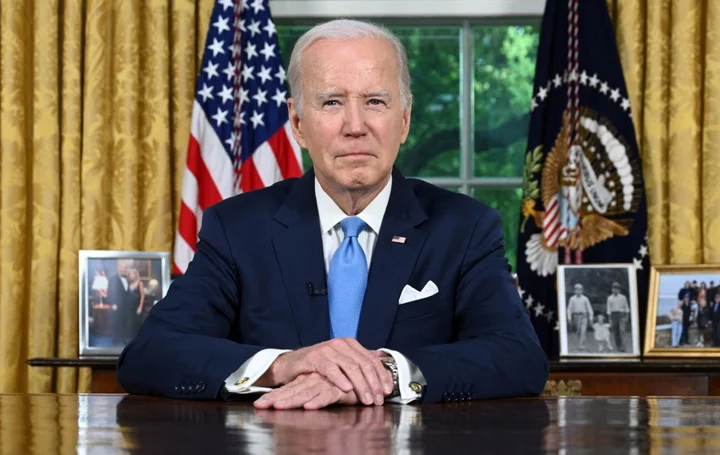
Biden calls for national unity as he hails debt limit agreement in Oval Office address
President Joe Biden on Friday urged Americans not to give up on working across the political aisle to solve national problems as he hailed the bipartisan legislation passed by Congress to stave off a catastrophic default on the nation’s sovereign debt as a good compromise that will protect the economic progress of the past two years. Speaking from the Oval Office during the prime-time television viewing hours — the first time he has addressed the nation from behind the iconic desk hewed from timbers taken from HMS Resolute — Mr Biden said he’d chosen to speak to the American people that night to “report on a crisis averted” and explain what his administration and Congress “are doing to protect America’s future” by enacting the spending agreement negotiated between his aides and top House Republicans. The president said he would sign the legislation on Saturday. “Passing this budget agreement was critical. The stakes could not have been higher,” he said, just moments after he told Americans that the goals of the agreement — “keeping the full, faith, and credit of the United States” and enacting “a budget that continues to grow our economy and reflects our values as a nation” – are “essential” to continuing the progress made during the first two years of his presidency. The president said “nothing” would have been more irresponsible or catastrophic than a failure by the US to pay its bills and laid out the dire consequences that a default would’ve brought on Americans of all stripes. “Our economy would have been thrown in recession. Retirement accounts for millions of Americans would have been decimated, eight million Americans would have lost their jobs. Default would have destroyed our nation’s credit rating, which would have made everything from mortgages to car loans to funding for the government much more expensive and it would have taken years to climb out of that hole — and America standing as the most trusted, reliable financial partner in the world would have been shattered,” he said. While Mr Biden said it was “critical” to reach the agreement he will sign into law and called it “good news for the American people,” he also stressed the necessity of compromise given the realities of Republican control of the House of Representatives and the thin one-seat majority by which his own party controls the Senate, as well as the importance of provisions in the bill that will ensure key social programmes will receive full funding in the next two years. “No one got everything they wanted but the American people got what they needed. We averted an economic crisis and an economic collapse,” he said. “We’re cutting spending and bringing deficits down. And, we protected important priorities from Social Security to Medicare to Medicaid to veterans to our transformational investments in infrastructure and clean energy.” He also touted the fact that the agreement preserved legislation like the PACT Act– which extends veteran benefits to service members who suffered health complications from burn pits – and the Inflation Reduction Act, as well as the CHIPS and Science Act, which promotes manufacturing of semiconductors in the United States. “Remember at the beginning of this debate, some of my Republican colleagues are determined to get the clean energy investments,” he said. “I said no, we kept them all.” Mr Biden’s remarks came less than 24 hours after the Senate approved the compromise bill by a margin of 63-36, and just over two days after the House of Representatives voted to advance the legislation. They represent the most extensive public comments the president has made on the now-resolved crisis after weeks of silence from the White House. Many in the president’s own party had criticised his reluctance to inject himself into the public discourse surrounding the negotiations. But a source close to the White House end of the process told The Independent on Thursday that Mr Biden’s silence was a deliberate choice, made out of necessity to avoid inflaming Republicans who would need to vote for the legislation to avert what most experts say would have been a worldwide economic disaster brought on by a US debt default. In the end, Mr Biden’s strategy proved successful in preventing Republican opposition from sinking the 11th-hour deal to save the US and world economies, and the White House was able to cajole all but a limited number of Democrats to give their support as well. Of the 51 members of the Senate Democratic caucus, just five joined 31 Republicans in opposition to the measure, which will suspend the nation’s statutory debt limit through the entirety of the 2024 election cycle while implementing limited spending cuts sought by the GOP and enacting some work requirements for non-disabled adults without children between the ages of 50 and 54 to access the Supplemental Nutrition Assistance Program, otherwise known as SNAP and formerly known as food stamps. A number of arch-conservatives in the House of Representatives had criticised the bill as giving away far too much to the White House, and in the end 71 members of the GOP conference voted against it, necessitating Democrats to contribute enough support to pass the GOP-controlled chamber. The bipartisan legislation, which was unveiled earlier this week following marathon negotiations between the White House and the Republican-led House of Representatives, will be signed into law with just two days remaining before the 5 June “X Date,” the day on which Treasury Secretary Janet Yellen had projected that the government would exhaust its ability to pay its outstanding debt obligations absent intervention from Congress. The spending and debt ceiling deal is the first major bipartisan agreement between the White House and the House since Mr McCarthy was elected Speaker after a record 15 ballots in January. The president had for months pledged not to negotiate while the GOP held out the possibility of a default as leverage to force him to endorse rolling back much of the legislative accomplishments enacted during his first two years in office, while Mr McCarthy had committed not to allow any bill that would lift the debt limit to move through his chamber absent concessions from the White House. The impasse persisted for months until Mr Biden extended an invitation to Mr McCarthy after the House passed what the GOP dubbed the “Limit, Save, Grow Act” — a bill to lift the debt ceiling and enact massive cuts to government programmes. Negotiations kicked into high gear late last month after the president tapped Shalanda Young, the director of the Office of Management and Budget, and Counsellor to the President Steve Ricchetti — one of his longest-serving and most trusted aides — to engage with two GOP House members chosen by Mr McCarthy, House Financial Services Committee Chair Patrick McHenry and Louisiana Representative Garret Graves. The president praised House Speaker Kevin McCarthy, as well as Senate Majority Leader Chuck Schumer, Senate Minority Leader Mitch McConnell and House Minority Leader Hakeem Jeffries for undertaking good-faith efforts to move the bill through their respective chambers with deliberate speed. “They acted responsibly and put the good of the country ahead of politics,” he said. “A final vote in both chambers was overwhelming.” He closed his address by emphasizing unity and the importance of “see[ing] each other’s not as adversaries but as fellow Americans” and “treat[ing] each other with dignity and respect” as a way to “lower the temperature” so both parties can “work together ... to pursue progress, secure prosperity and keep the promise of America for everybody”. “I know bipartisanship is hard, and unity is hard, but we can never stop trying because in moments like this one, the ones we just faced, where the American economy in the world economy is at risk of collapsing,” he said. “There’s no other way. With reporting from Andrew Feinberg in New Hampshire and from Eric Garcia in Washington Read More Senate passes debt limit bill after marathon 11 amendment votes to avoid default Angry progressives and conservatives hit out as Democrats push through Biden-McCarthy debt ceiling deal FBI offers to show GOP chairman document that purports to relate to Biden, his family Republicans schedule 1st presidential debate for Aug. 23, but there's no guarantee Trump will attend DeSantis wraps up 1st early states tour as candidate with more personal touch in South Carolina
1970-01-01 08:00
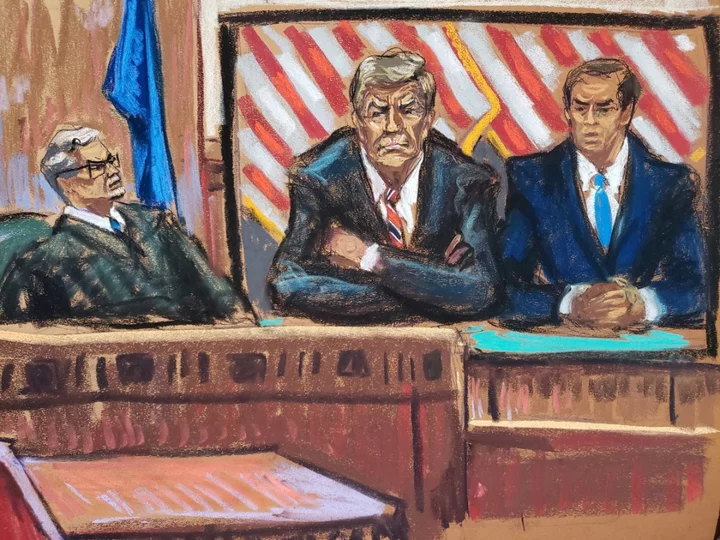
Trump wants New York judge removed in Manhattan hush-money case
Hours after he was criminally charged with 34 courts of falsifying business records in New York City, Donald Trump retreated to his Mar-a-Lago resort to lambast the “Trump-hating” judge presiding over his case in Manhattan criminal court. Now, lawyers for the former president and frontrunner for the 2024 Republican presidential nomination are pressing Judge Juan Merchan to recuse himself from the case, pointing to his daughter’s political consulting work and small-dollar campaign donations. A court filing made public on 2 June – days after Mr Trump’s virtual court appearance for a hearing to abide by a court order prohibiting his sharing of evidence in the case – also took issue with Mr Merchan’s role in a case involving convicted former Trump Organization CFO Allen Weisselberg, who pleaded guilty to 15 tax violations in what prosecutors called a years-long fraud scheme. In April, Mr Trump was criminally charged in connection with repayments to his then-lawyer Michael Cohen in an alleged hush-money scheme to prevent the release of potentially damaging stories about Mr Trump and his alleged affairs. Mr Trump has pleaded not guilty. Attorney for Mr Trump argued that the judge’s daughter’s political consulting work could be seen as an actual or perceived conflict of interest for the judge, and his potential role in the case could “result in a financial benefit” for his daughter who “stands to profit from negative rulings or a conviction” against Mr Trump. Mr Trump’s lawyers also want Mr Merchan to “put on the record relevant information surrounding what appear to be certain political contributions.” Mr Merchan appears to have donated $15 to President Joe Biden campaign and $20 to two advocacy groups in 2020, according to federal campaign finance records. Mr Trump, Cohen and the former owner of the National Enquirer David Pecker allegedly worked in concert to “identify, purchase, and bury negative information about him and boost his electoral prospects” leading up to the 2016 presidential election, according to prosecutors. The alleged payments were used to cover up sex scandals as part of a “conspiracy to undermine the integrity of the 2016 election,” according to prosecutors. Hours after he first appeared in criminal court on 4 April, and after the judge warned him against making any incendiary remarks or personal attacks, Mr Trump immediately flew back to his Mar-a-Lago resort in Florida, where he went on to do just that. “I have a Trump-hating judge, with a Trump-hating wife and family,” he said that night. He called Manhattan District Attorney Alvin Bragg “a local failed district attorney” and a “criminal” who should resign. Prosecutors have argued that a protective order was necessary to keep Mr Trump – who already has repeatedly lashed out at the judge and prosecutors – from broadcasting information about the case before a jury has been selected and a trial begins. Last month, the former president made his first appearance in court since his indictment, appearing on a video screen in front of two American flags with golden fringes seated next to his attorney. Mr Trump, who continues to rely on his online bully pulpit with an audience of obedient followers to broadcast veiled threats and insults at his perceived enemies, is prohibited from disseminating “covered materials” on social media platforms “including, but not limited, to Truth Social, Facebook, Instagram, WhatsApp, Twitter, Snapchat, or YouTube, without prior approval from the court,” according to a protective order issued last month. A trial is set to begin on 25 March 2024 – days after voting begins in presidential primaries. Read More Trump news - live: Classified document noted on tape is reportedly missing as Trump reacts to no Pence charges Trump investigation in Georgia could include other states in sweeping racketeering case, report says Trump and DeSantis must pledge to support eventual White House nominee as first debate announced Trump reacts to report Pence won’t face charges for classified documents: ‘I’m at least as innocent as he is’
1970-01-01 08:00

Ukraine's cross-border tactics are aimed at destabilizing Russia. Judging by the response, they're working
Ukraine has opened a new front in its battle to drive out the Russian invader - in Russia. But it is oddly coy about admitting that it has sent troops, fired artillery, and flown drones into its neighbor's territory.
1970-01-01 08:00
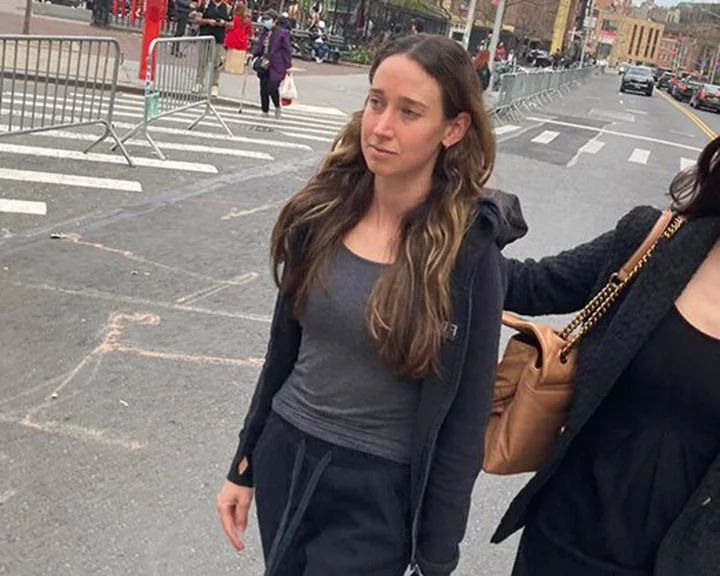
Frank Founder Charlie Javice Says JPMorgan Documents Will Exonerate Her
Frank founder Charlie Javice is seeking access to JPMorgan Chase & Co. documents she says will exonerate her
1970-01-01 08:00
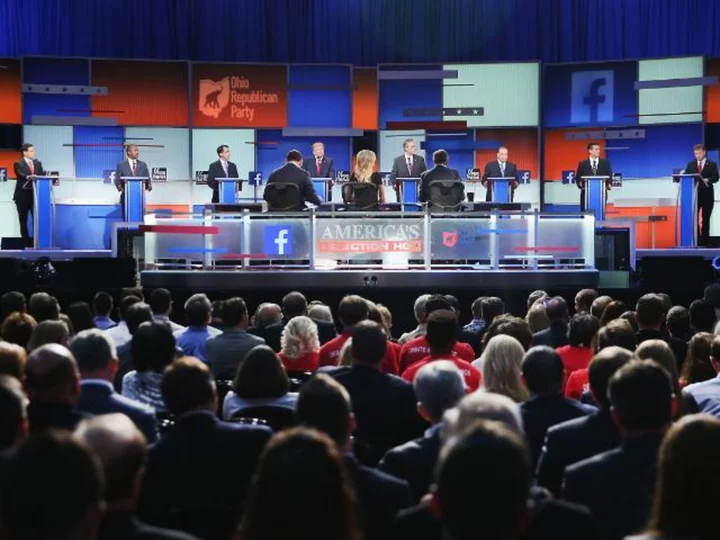
Republicans set polling and donor threshold to qualify for first presidential debate on August 23
The Republican National Committee announced Friday that the first presidential primary debate will take place on August 23 in Milwaukee and also laid out the polling and donor thresholds candidates must meet to make the stage.
1970-01-01 08:00

Fulton County DA seeking information from 2 firms that Trump hired to look at 2020 voter fraud claims -- and debunked them
The Fulton County district attorney's office is seeking information from two firms that were hired by the Trump campaign with investigating claims of voter fraud after the 2020 election, according to sources familiar with the matter.
1970-01-01 08:00
